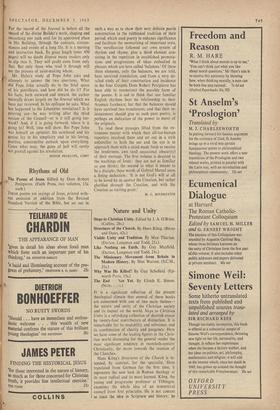Rhythms of Old
THESE poems are sayings of Jesus, printed with- out omission or addition from the Revised Standard Version of the Bible, but set out in such a way as to show their very definite poetic construction in the rabbinical tradition of their period, which used poetry to enhance significance and facilitate the memorising of important texts. The versification followed our own system of rhythm and rhyme, plus a third element con- sisting in the repetition in established permuta- tions and progressions of ideas embodied in phrases which are here called 'balances.' Of these three elements, only the balances, we are told, have survived translation, and from a very de- tailed study of their construction and incidence in the four Gospels Dom Robert Petitpierre has been able td reconstruct the possible form of the poems. It is sad to think that our familiar English rhythms bear no relationship to their Aramaic forebears; but that the balances should have survived two translations, and that their re- instatement should give us such pure poetry, is perhaps an indication of the power to move of the originals.
To read these passages lifted from the ex- traneous matter with which their all-too-human reporters involved them and set out in a style unfamiliar to both the ear and the eye is to approach them with a mind made fresh to receive the tenderness, awe (and occasional obscurity) of their message. The first volume is devoted to the teachings of Jesus : they are not as familiar as one thinks; the second to what it means to be a disciple; these words of Gabriel Marcel seem a fitting deduction : 'It is not God's will at all to be loved by us against the Creation, but rather glorified through the Creation, and with the Creation as starting point.'
M. C. BOUMEESTER






































 Previous page
Previous page